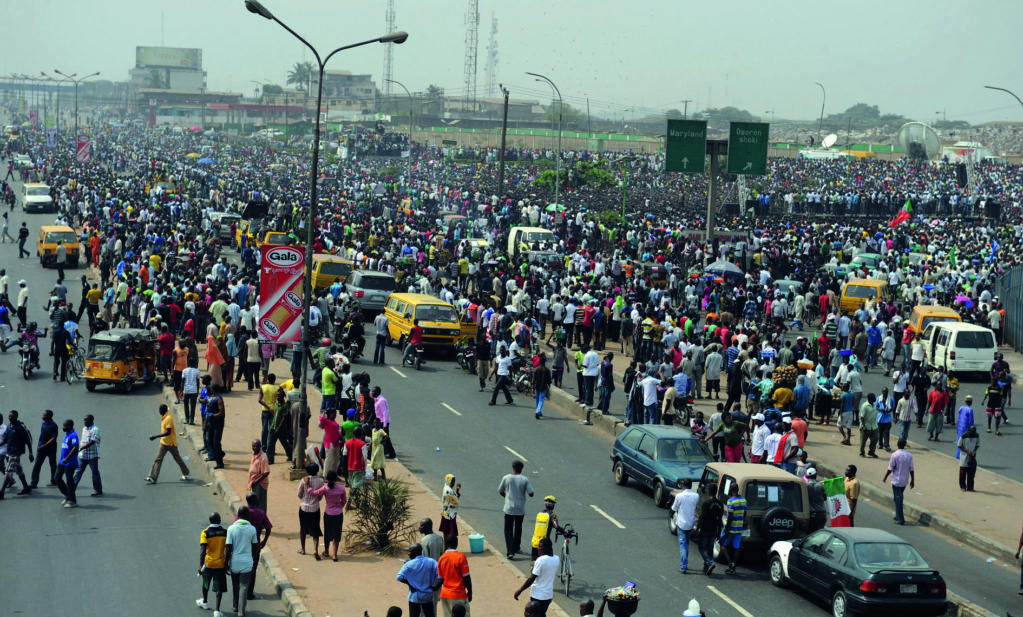On New Year’s Day, Nigerian president, Goodluck Jonathan, announced the end of the country’s 19-year-old fuel subsidy. It meant the fuel price soared by 116% (to 150 naira from 65) overnight. Before then a liter of oil was cheaper than a 350ml can of coke.
The reason, according to the government, is that the subsidies have strained the country’s coffers.
The people were angry, with labor and civil society groups organizing nation-wide strikes. Protestors stormed Nigerian airports to prevent operators from checking in more than 500 passengers—a mere sideshow in what was to prove a massive and violent protest.
On any given day, traffic on the Lekki expressway, where it meets Ozumbo Nbadiwe Street in Victoria Island, Lagos, resembles a writhing dragon, seeking escape. The mass action left these streets deserted. Protestors shut down petrol stations, banks, shops, schools, offices and ports. Barricades went up and tens of thousands took to the streets.
The protests turned violent; a curfew was imposed in the Kuduna and Niger states. Borno state was placed under a state of emergency. Fourteen people were injured in Kano as the protestors clashed with police. The police used teargas and live ammunition to disperse the crowds. In the confusion the authorities put the death toll anywhere between three and 22.
Loading...
Nigeria is Africa’s largest oil exporter and the fifth largest provider of oil to the United States. Its economy relies heavily on oil, with production of approximately 2.5 million barrels per day with a target of increasing to three million bpd this year.
The reported $7.4 billion a year that will be diverted from the subsidies is to go towards investment in infrastructure. This is the idea of the Subsidy Reinvestment and Empowerment Programme. Pouring the money into infrastructure projects in power, transportation, roads, water and petroleum sectors. The creation of a downstream sector could lead to job creation and a large stream of revenue on the way to lending Nigeria middle-income status.
For the 160 million people in Nigeria, the long-run benefits of the subsidy removal are as naught, compared to rising food and transport prices.
Wole Famurewa, a presenter at CNBC Africa [in Nigeria] says: “The price of bread was up by 10% after the first week. ”
This is what the people, most earning less than $1.25 a day, now face.
Several reports indicate that the strikes cost the economy between $600 million and $1 billion dollars per day, with worries over the Nigerian oil supply pushed up global oil prices. The fifth day of the strike came with a threat by workers to completely cut output on Januart 14 if fuel price was not put back to 65 naira ($0.40).
The last oil strike was in 2007, when outgoing president, Olusegun Obasanjo, raised fuel prices, doubled value-added tax and privatized refineries.
The Department of Petroleum Resources said: “Both parties know the importance of the negotiation and we are quite confident that they will come to an agreement.”
At this point, the labor movement had declined an offer by the government to reduce fuel prices to 100 naira-a-liter and Nigeria’s House of Representatives passed a motion urging government to return fuel subsidies.
The mass action in Nigeria takes place against the backdrop of the Petroleum Industry Bill (PIB). PIB seeks to deregulate and decentralize the oil and gas industry to make it more efficient. The process of transforming the Bill into law has stalled for more than five years. Civil society argues, the solution for government should not be in the removal of subsidies, but decentralizing and deregulating the industry to be more efficient and profitable.
A possible compromise could be to phase out the subsidies, rather than scrap them. On January 16, the government agreed to a fuel price of 97 naira ($0.60) and the strike was suspended.
Loading...
